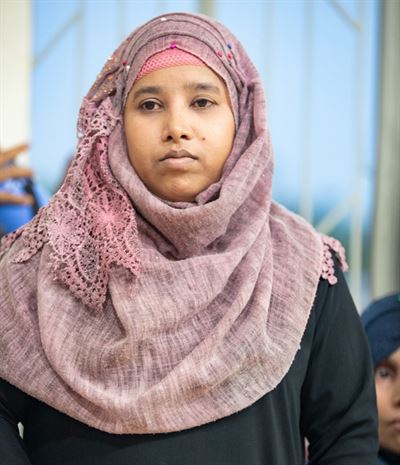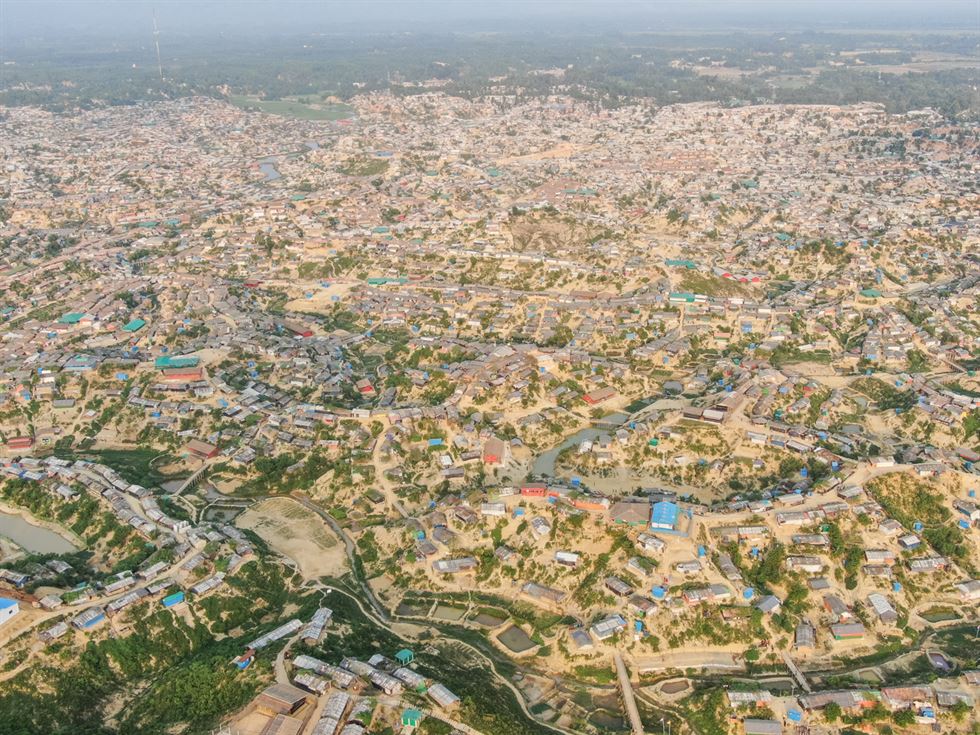Rohingya refugees' political group cries out for equal rights as Myanmar citizens
Updated : 2019-05-05 09:57
Mohib Ullah, left, a leader of Arakan Rohingya Society for Peace and Human Rights (ARSPH), speaks through a megaphone during an evening gathering between ARSPH members and a group of foreign journalists in Kutupalong camp in Cox's Bazar, Bangladesh, April 16. Courtesy of W-TIMES
By Jung Da-min
COX'S BAZAR, Bangladesh ― The Arakan Rohingya Society for Peace and Human Rights (ARSPH) is a political awakening for Rohingya refugees who fled the "systematic persecution from birth to death" of the Myanmar government.
Formed at the Lambashia, Kutupalong refugee camp in Ukhiya, Cox's Bazar, a southeast coastal city in Bangladesh near the border with Myanmar, the group has started to take itself to international consultative gatherings to testify against the Myanmar government.
On April 16, about 12 ARSPH members gathered at the Camp-2W office of the 34-unit mega camp, to meet dozens of journalists of different nations from around the world.
 |
| Serazunesm, a 34-year-old Rohingya refugee / Courtesy of W-TIMES |
"Most of the time, the women and children were facing the genocide more than men did, as we could not go far away," she said, referring to the restriction on movement of Rohingya people imposed by the Myanmar government.
She said she is one of the Rohingya victims who experienced violence in Myanmar, and she and one of her daughters sustained gunshot wounds during one incident in which another family member of hers was shot dead.
She also talked about the sexual abuse the Rohingya women faced, especially that committed by the Myanmar police and paramilitary border force known as the Nasaka.
She said Rohingya women had to receive "medical checkups" done by the male Nasaka officials, which often led to sexual violence.
A view of the Rohingya refugee camp in Cox's Bazar, the camp 17 area of the 34-unit mega camp / Korea Times photo by Jung Da-min
Although women and children are the most vulnerable to oppression, the reality Rohingya men face is also harsh.
Abdul Rohion, 53, was a teacher at a government-run high school but had no choice but to leave his home in Myanmar as the government did not protect him from the oppression he was facing.
"We want to go home with dignity, safety and security of life," said Rohoin, who is now a member of ARSPH in the Cox's Bazar camp.
He said he'd feel safer about returning to his home country if the Myanmar government gave citizenship back to the Rohingya people.
After the Myanmar Citizenship Law was created in 1982, Myanmar's Border Immigration Force withdrew the Rohingyas' citizenship documentation in 1993.
Rohion said his father and grandmother had Myanmar citizenship cards, saying they were the evidence that Rohingya were also citizens of Myanmar. Abdul Rohion, a 53-year-old Rohingya refugee who used to be a teacher in Myanmar, shows his father's Myanmar passport to journalists. Korea Times photo by Jung Da-min
Abdul Rohion, a 53-year-old Rohingya refugee who used to be a teacher in Myanmar, shows his father's Myanmar passport to journalists. Korea Times photo by Jung Da-min
"The main thing our Rohingya people want is to return to our homeland in Rakhine State with our full rights," the group said in a letter to the visiting delegation.
The group also strongly argued the international community should be including Rohingya voices when discussing Rohingya issues.
Earlier in November 2017, the two governments of Bangladesh and Myanmar agreed on the repatriation of Rohingya refugees, but the plan has so far been delayed due to the Rohingya people's fears for their safety in Myanmar.
With no guarantee of safety, the Rohingyas living in the refugee camp will doubtless be staying for a while as it is unlikely the Myanmar government will change its policies anytime soon.
The Bangladesh government, however, says the country has reached a threshold where it cannot accommodate refugees for a long period of time.
According to Bangladesh government data, the total population of Rohingya refugees in Bangladesh is nearly 1.12 million with the number of orphans being about 40,000, making the Cox's Bazar refugee camp the fifth-largest city in the country.
Mahammad Mizanur Rahman, who is the deputy secretary of the Bangladesh Ministry of Disaster Management and Relief, and also additional commissioner of the Refugee Relief and Repatriation Commission (RRRC), warned the hospitality the local Bangladesh people have shown to the Rohingya refugees could turn to hostility if they stay for too long.
The local Bangladesh people in Cox's Bazar "shared their houses, their food and shelter … But for how long? Hospitality turns hostility, it's very natural," Rahman said. "We're a small and developing country and starting into 160 million people with our own populations. … There is no plan B. We will be happy to repatriate them as soon as possible."
Rahman said the Bangladesh government wants the international community to increase pressure on the Myanmar government as it did not see "real willingness" in the Myanmar government on the repatriation issue.
 The Rohingya refugee camp in Cox's Bazar is crowded with refugees and cars from international humanitarian aid organizations. Courtesy of W-TIMES
The Rohingya refugee camp in Cox's Bazar is crowded with refugees and cars from international humanitarian aid organizations. Courtesy of W-TIMES
Although women and children are the most vulnerable to oppression, the reality Rohingya men face is also harsh.
Abdul Rohion, 53, was a teacher at a government-run high school but had no choice but to leave his home in Myanmar as the government did not protect him from the oppression he was facing.
"We want to go home with dignity, safety and security of life," said Rohoin, who is now a member of ARSPH in the Cox's Bazar camp.
He said he'd feel safer about returning to his home country if the Myanmar government gave citizenship back to the Rohingya people.
After the Myanmar Citizenship Law was created in 1982, Myanmar's Border Immigration Force withdrew the Rohingyas' citizenship documentation in 1993.
Rohion said his father and grandmother had Myanmar citizenship cards, saying they were the evidence that Rohingya were also citizens of Myanmar.
Other ARSPH members also said Rohingya refugees want their full citizenship rights back, which includes the return of their land and access to business, healthcare and education with no special restrictions.
"The main thing our Rohingya people want is to return to our homeland in Rakhine State with our full rights," the group said in a letter to the visiting delegation.
The group also strongly argued the international community should be including Rohingya voices when discussing Rohingya issues.
Earlier in November 2017, the two governments of Bangladesh and Myanmar agreed on the repatriation of Rohingya refugees, but the plan has so far been delayed due to the Rohingya people's fears for their safety in Myanmar.
With no guarantee of safety, the Rohingyas living in the refugee camp will doubtless be staying for a while as it is unlikely the Myanmar government will change its policies anytime soon.
The Bangladesh government, however, says the country has reached a threshold where it cannot accommodate refugees for a long period of time.
According to Bangladesh government data, the total population of Rohingya refugees in Bangladesh is nearly 1.12 million with the number of orphans being about 40,000, making the Cox's Bazar refugee camp the fifth-largest city in the country.
 |
| A panorama of the Rohingya Refugee camp in Cox's Bazar, Bangladesh / Courtesy of W-TIMES |
Mahammad Mizanur Rahman, who is the deputy secretary of the Bangladesh Ministry of Disaster Management and Relief, and also additional commissioner of the Refugee Relief and Repatriation Commission (RRRC), warned the hospitality the local Bangladesh people have shown to the Rohingya refugees could turn to hostility if they stay for too long.
The local Bangladesh people in Cox's Bazar "shared their houses, their food and shelter … But for how long? Hospitality turns hostility, it's very natural," Rahman said. "We're a small and developing country and starting into 160 million people with our own populations. … There is no plan B. We will be happy to repatriate them as soon as possible."
Rahman said the Bangladesh government wants the international community to increase pressure on the Myanmar government as it did not see "real willingness" in the Myanmar government on the repatriation issue.
Comments
Post a Comment